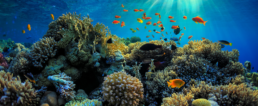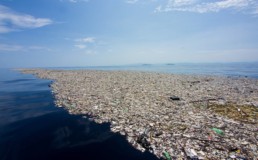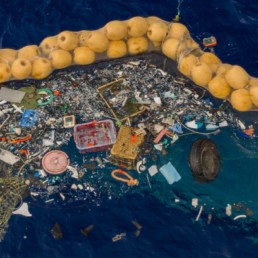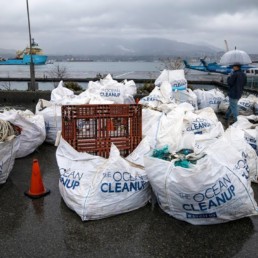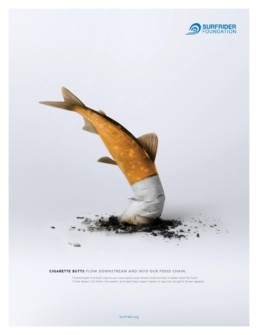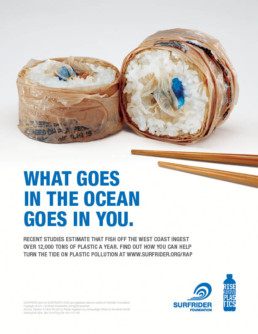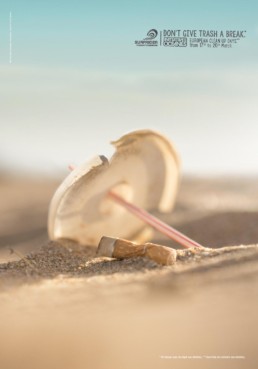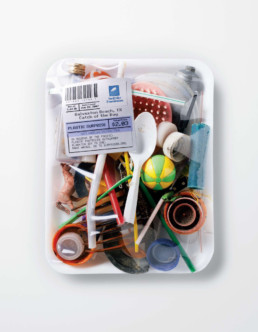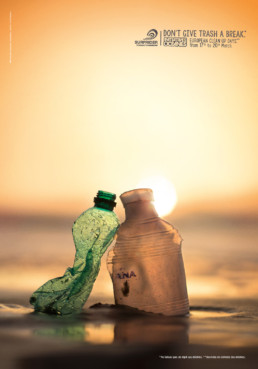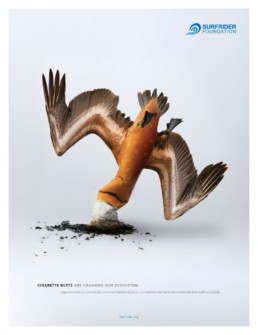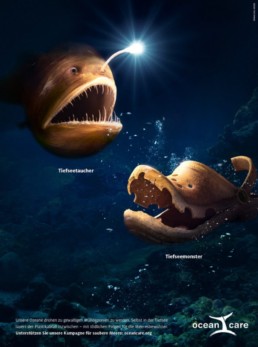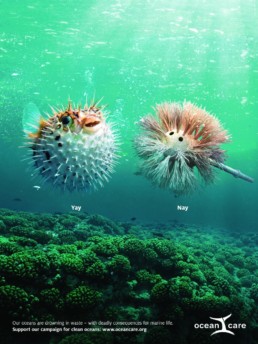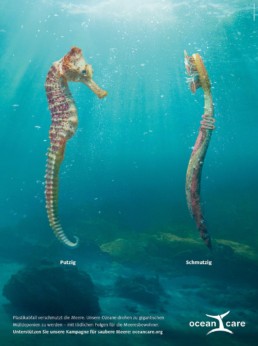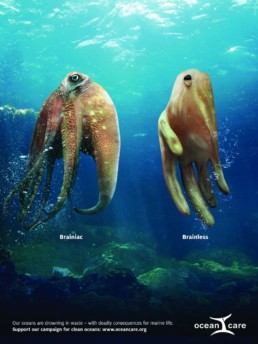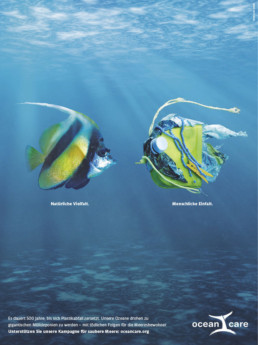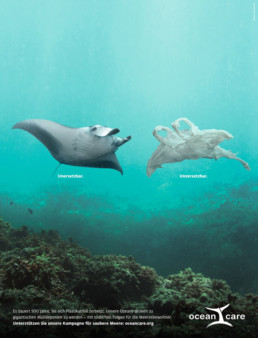Rough Waters
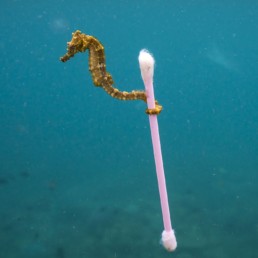
The Pressing Issue
Plastic accumulating in our oceans and on our beaches has become a global crisis. Researchers have estimated that we produce about 300 million tonnes of plastic waste each year – equivalent to the weight of the entire human population. If these trends continue, it is expected that by 2050 there will be more plastic than fish. According to the United Nations, at least 800 species worldwide are affected by marine debris which consists mostly of plastic (80%). Every year, plastic debris causes the deaths of more than a million seabirds as well as over 100,000 marine mammals. Fish, seabirds, sea turtles, and marine mammals can become entangled in or ingest the plastic waste, causing suffocation, starvation, and drowning. A 2019 study based on four years of diving on 159 reefs in the Pacific shows that reefs in four countries – Thailand, Australia, Indonesia, and Myanmar – are heavily contaminated with plastic, which clings to the coral, sickening or killing it. If these trends continue, it is expected that by 2050 there will be more plastic in the ocean than fish. Entrepreneurs, non-profit organizations, and environmentalists have worked tirelessly to save marine life through state of the art inventions and relief programs that not only transform our distressed and polluted oceans, but go further to cleanse the food, water, and air humans consume.
Working Towards a Cleaner Ocean
The Ocean Cleanup Project
In 2013, at the age of 19 years old, entrepreneur Boyan Slat founded The Ocean Cleanup, a nonprofit organization with the mission to rid the world’s oceans of plastic. The organization has designed a device to clean the Great Pacific Garbage Patch, a trash-filled vortex in the middle of the ocean that is 1.6 million square kilometers – that’s more than twice the size of Texas. Research performed by The Ocean Cleanup shows that the majority (90%) of plastic debris in the vortex is located in the top 5 m of the upper 2,000 m of the sampled water. The remaining 10% were dispersed across water depths of 5-2000 m. Once microplastics sink below the surface, cleanup becomes even more difficult, if not impossible. In December 2019, The Ocean Cleanup completed its first mission, collecting 60 bags of trash collected from the Great Pacific Garbage Patch. The trash was hauled to Vancouver and will be used to create new sustainable products by September 2020. The organization has begun preparations for the next system, System 002, with the aim to create a full-scale, fully functional system. System 002 is recognized as the key stepping stone to a full-scale cleanup of the Great Pacific Garbage Patch.
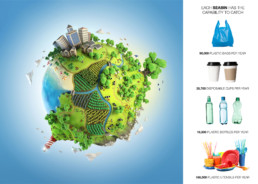
Seabin Project
In 2015, Pete Ceglinski and Andrew Turton founded the Australian Company, Seabin Project. One of the goals for the Seabin Project is to provide practical and tangible solutions to reduce plastic waste in our oceans. The team launched the Seabin V5 unit in 2017. The unit is a ‘trash skimmer’ designed to be installed in the water of Marinas, Yacht Clubs, Ports, and any other body of water with a calm environment. The Seabin V5 acts as a floating garbage bin skimming the surface of the water by pumping water into the device. It can intercept floating debris, macro and microplastics, as well as microfibers with an additional filter. It is also equipped with oil absorbent pads that are able to absorb petroleum-based surface oils and other pollutants. The Seabin V5 captures an estimated 1.4 tons of debris per year and has a running cost of $3.00 a day. The Seabin V5 has won an abundance of awards, including the 2018 Sustainability Award, 2018 Innovation Awards, and 2018 Social Impact Award. Today there are 860 seabins across the oceans that have caught 936,715 kg of waste, bringing us one step closer to a clean ocean.
The Surfrider Foundation
The Surfrider Foundation is dedicated to the protection and enjoyment of the world’s ocean, waves, and beaches through a powerful activist network. Their team consists of over 50 volunteers and environmental activists that support their mission through networking, campaigning, advocating, and fundraising. The Surfrider Foundation focuses its efforts on five key areas: beach access, clean water, ocean protection, coastal preservation, and plastic pollution.
The foundation has a variety of different programs to further its mission of protecting the world’s oceans:
-
The Blue Water Task Force is the Surfrider Foundation’s volunteer-run program for water testing, education, and advocacy. This volunteer water testing program is used to raise awareness of local pollution problems and bring together communities to implement solutions. Blue Water Task Force labs measure fecal indicator bacteria levels in recreational waters and compare them to water quality standards set to protect public health.
-
The Ocean Friendly Gardens Program contours landscapes for rainwater retention, create living soil to sponge up water, filters pollution and sequesters carbon, and installs climate-appropriate plants to create wildlife habitats and a sense of place.
-
The Ocean Friendly Restaurants Program increases awareness, drives behavior change, and ultimately creates a scalable impact to reduce our plastic footprint in restaurants. Restaurants participating in this program must have no styrofoam use, follow proper recycling practices, only use reusable food ware for onsight dining, and provide paper straws when requested. There are currently 607 restaurants across the country recognized as OFRs.
-
Rise Above Plastics is designed to eliminate the impacts of plastics in the marine environment by raising awareness about the dangers of plastic pollution and by advocating for a reduction of single-use plastics and the recycling of all plastics. The Surfrider Foundation website supplies its viewers with 10 easy ways to reduce your plastic footprint.
-
The Smartfin is a surfboard fin with sensors that measure important ocean properties that help researchers and coastal communities understand trends in ocean health. With the Smartfin, surfers become citizen scientists, turning wave sets into data sets simply while surfing.
OceanCare
OceanCare was founded in 1989, and has been committed to marine wildlife protection since 2011. OceanCare has teamed up with British Divers for Marine Life Rescue (UK), Oceans Research (South Africa), Olive Ridley Project (Maldives), and the Centre de Soins de la Faune Sauvage (France) to support the rescue of marine animals from water pollution. Through their efforts, the lives of many whales, dolphins, seals, and sea turtles have been saved and freed from plastic waste. Mobile waterproof Medical Kits are also disbursed to OceanCare teams that contain everything necessary for rescuing and taking care of animals. In 2018, British Divers for Marine Life Rescue carried out 1279 rescue operations for seals, dolphins, whales, sea turtles, and seabirds with the help of OceanCare’s support. The team continues to work closely with marine wildlife, hoping to end the unnatural deaths from plastic pollution.
Just a few of the OceanCare milestones:
1989 - In Martigny, Switzerland, OceanCare blocks the construction of a new dolphinarium.
2002 - The Silent Oceans campaign against underwater noise is launched. At the symposium ‘Whale Zone’ near Zurich, renowned scientists, politicians, and marine protection activists discuss protection measures for marine mammals and oceans.
2003 - OceanCare co-founds the International Ocean Noise Coalition, which is joined by 150 organizations worldwide. A petition by OceanCare urges NATO members to optimize military tests in order to minimize impacts on marine mammals.
2007 - A study by OceanCare and the Environmental Investigation Agency on mercury contamination prompts a Japanese supermarket chain to remove whale and dolphin meat from its product range.
2018 - OceanCare takes part in the first official negotiations for the planned UN High Seas Agreement (BBNJ) in New York. The delegation emphasizes that environmental impact assessments are urgently needed on the high seas – specifically taking into account underwater noise – and that marine protected areas are crucial.
Plastics are the most common element found in the ocean today which is extremely harmful to the environment as it does not break down easily and is often mistaken for food by marine animals. While it is difficult to say exactly how much plastic is in the ocean today, scientists estimate about 8 million metric tons of plastic enter the ocean every year. To put that into perspective, that is the weight of nearly 90 aircraft carriers. If you, I, and those around the world are to preserve our oceans, drastic measures must be taken to combat this pollution. Plastics cause more than 80% of the negative effects on animals associated with ocean pollution, and over 100,000 marine animals die every year from plastic entanglement ingestion. Worldwide, drastic measures must be taken in order to save our oceans from the irreversible effects of plastic pollution. Volunteering at foundations who are dedicated to cleaning the oceans, supporting young entrepreneurs’ ocean clean up inventions, eating at ocean-friendly restaurants, or simply reducing your own plastic footprint can help immensely and bring us one step closer to a plastic-free ocean, and a safe home for all of marine life.
